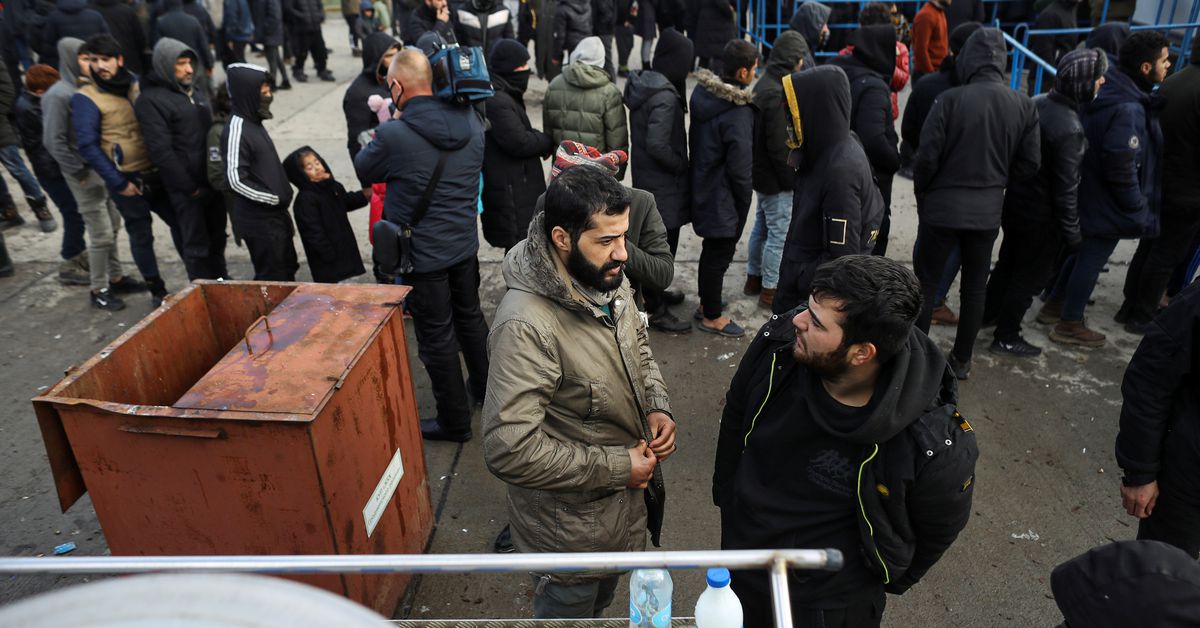WARSAW/BIALYSTOK, Poland, Nov 20 (Reuters) – The number of migrants trying to force their way into Poland from Belarus fell again on Friday after an apparent change in tack by Minsk that could help calm a crisis that has escalated into a major East-West confrontation.
The Polish Border Guard said on Twitter that there were 195 attempts to cross the frontier on Friday, down from 250 on Thursday and 501 the day before, though Warsaw warned that the migrant crisis was far from over.
Europe accuses Belarus of flying in thousands of people from the Middle East and pushing them to cross into the EU, which has been at odds with Belarusian President Alexander Lukashenko since a disputed election last year.
Register now for FREE unlimited access to reuters.com
Register
Belarus, which denies fomenting the crisis, cleared a migrant camp near the border on Thursday and started to repatriate some people to Iraq, but Poland said on Friday that Minsk was still trucking hundreds of migrants to the frontier.
“Yesterday … there were several attempts to forcefully cross the border. The largest group consisted of about 200 foreigners, the others of tens of people. The foreigners were aggressive – they threw stones, firecrackers and used teargas,” the Border Guard said on Twitter on Saturday.
Polish police said that during one crossing attempt on Friday near the village of Starzyna, Belarusian servicemen threw stones towards Polish border guards, policemen and soldiers, resulting in police cars being damaged.
HUMANITARIAN CRISIS
Rights groups have criticised Poland’s nationalist government over its treatment of migrants, with accusations of multiple pushbacks and failure to provide medical support as well as adequate food and shelter.
About 10 migrants are believed to have died in woods along the border with frigid winter setting in, according to local authorities, and many more have sustained injuries or suffered without food or water for days.
Poland has imposed a state of emergency close to the border and does not let journalists or NGOs operate in the area. It says its uniformed services provide adequate care to migrants who make it into Poland when necessary.
Migrants gather outside the transport and logistics centre Bruzgi on the Belarusian-Polish border in the Grodno region, Belarus November 20, 2021. REUTERS/Kacper Pempel
Read More
Hundreds of Poles took part in two separate protests in Warsaw and the town of Hajnowka close to the Belarusian border on Saturday to express their support for migrants and demand help for them.
“We are here to strongly oppose this, because we want no one in our country to die in the forest, no one to be starving in the forest, and no one to be detained in the forest”, said Adrianna Klimaszewska, a social activist from Wroclaw who took part in the “Mothers to the border” protest in Hajnowka.
“We demand this of our country. We demand access for medics to the border area, we demand access for humanitarian organizations.”
‘GO TO POLAND’
Despite the fall in the number of attempts to cross the border, Polish officials said they expected further tensions.
“No, this political crisis is not coming to an end. Belarus is still interested in escalating and continuing operations against Poland,” Stanislaw Zaryn, spokesman for Poland’s security services, wrote on Twitter.
Polish Prime Minister Mateusz Morawiecki will visit Lithuania, Latvia and Estonia on Sunday to discuss the crisis, a government spokesman said on Saturday.
Migrants in a so-called ‘safe place’ run by locals on the Polish side of the border told Reuters that even after the camp was dismantled, Belarusian security forces kept pushing them to cross the border. One of them succeeded on Thursday night.
“We came through the forests, they (Belarusian forces) were telling us every day ‘Go to Poland’ and we could not cross, so they tried making us cross by force,” a Syrian migrant said.
“It was very tiring, cold, with no food, no water, no warmth or anything. I came looking for a peaceful country, I just want to live,” he added.
Register now for FREE unlimited access to reuters.com
Register
Reporting by Anna Wlodarczak-Semczuk, Sergiy Karazy, Anna Koper, Yara Abi Nader, Fedja Grulovic, Stephan Schepers; Writing by Anna Wlodarczak-Semczuk and Anna Koper; Editing by David Clarke, Ros Russell and Christina Fincher
Our Standards: The Thomson Reuters Trust Principles.





